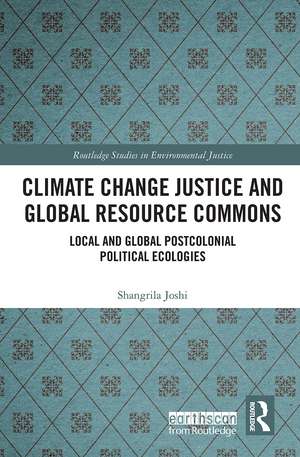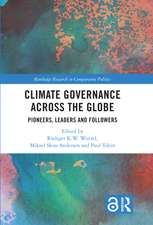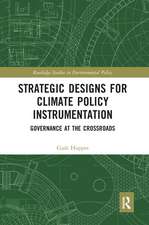Climate Change Justice and Global Resource Commons: Local and Global Postcolonial Political Ecologies: Routledge Studies in Environmental Justice
Autor Shangrila Joshien Limba Engleză Paperback – 9 ian 2023
Shangrila Joshi engages in a multi-scalar analysis of the myriad ways in which various resource commons – predominantly atmosphere and forests – are implicated in climate governance, with a consistent emphasis throughout on the justice implications for disenfranchised communities. The book starts with an analysis of North-South inequities in responsibility, vulnerability, and capability, as evidenced in global climate treaty negotiations from Rio to Paris. It then moves on to examine the ways in which structural inequalities are built into the conceptualization and operationalization of various neoliberal climate solutions such as Reducing Emissions from Deforestation and Forest Degradation (REDD+) and the Clean Development Mechanism (CDM). Drawing on qualitative interviews conducted in Delhi, Kathmandu, and the Terai region of Nepal, participant observation at the Climate Conference in Copenhagen (COP-15), and textual analysis of official documents, the book articulates a geography of climate justice, considering how ideas of injustice pertaining to colonialism, race, Indigeneity, caste, gender, and global inequality intersect with the politics of scale.
This book will be of great interest to students and scholars of environmental justice, climate justice, climate policy, political ecology, and South Asian studies.
| Toate formatele și edițiile | Preț | Express |
|---|---|---|
| Paperback (1) | 368.98 lei 6-8 săpt. | |
| Taylor & Francis – 9 ian 2023 | 368.98 lei 6-8 săpt. | |
| Hardback (1) | 1002.36 lei 6-8 săpt. | |
| Taylor & Francis – 5 apr 2021 | 1002.36 lei 6-8 săpt. |
Preț: 368.98 lei
Nou
Puncte Express: 553
Preț estimativ în valută:
70.61€ • 73.45$ • 58.30£
70.61€ • 73.45$ • 58.30£
Carte tipărită la comandă
Livrare economică 14-28 aprilie
Preluare comenzi: 021 569.72.76
Specificații
ISBN-13: 9780367751296
ISBN-10: 0367751291
Pagini: 236
Ilustrații: 40
Dimensiuni: 156 x 234 mm
Greutate: 0.44 kg
Ediția:1
Editura: Taylor & Francis
Colecția Routledge
Seria Routledge Studies in Environmental Justice
Locul publicării:Oxford, United Kingdom
ISBN-10: 0367751291
Pagini: 236
Ilustrații: 40
Dimensiuni: 156 x 234 mm
Greutate: 0.44 kg
Ediția:1
Editura: Taylor & Francis
Colecția Routledge
Seria Routledge Studies in Environmental Justice
Locul publicării:Oxford, United Kingdom
Public țintă
UndergraduateCuprins
1. Introducing Climate Change as a Global Commons Problem 2. North-South Climate Politics and the Role of India 3. Postcolonialism and the Struggle over the Atmospheric Commons 4. Environmental Justice and the Right to Development 5. From the Forest Commons to Carbon Commodities? 6. Learning from Nepal’s Experience of Taking Back the Forest Commons 7. A Multi-scalar Postcolonial Political Ecology of the Commons in an Era of Climate Crisis
Notă biografică
Shangrila Joshi is a member of the faculty at The Evergreen State College, USA.
Recenzii
"Powerful in its philosophy and comprehensive in its research, Dr. Joshi sets a new pathway for equitable solutions to climate change. The book lifts up diverse voices and recent developments in anti-colonial theory, advancing an environmental justice future where we can imagine our actions across interconnected scales of the commons." -- Kyle Whyte, Professor of Environment and Sustainability, University of Michigan, USA; White House Environmental Justice Advisory Council, President Biden's Executive Order on Tackling the Climate Crisis at Home and Abroad.
"The climate system is a global commons but one whose management impinges in hugely problematic ways on local peoples, local economies, and local resources. With the goals of opposing climate injustice and decolonizing environmental management, Shangrila Joshi addresses this urgent contradiction of political ecology by carefully exploring real-world struggles over forest lands, rights, and resources." -- Paul Robbins, Dean, Nelson Institute for Environmental Studies, University of Wisconsin-Madison, USA
"This timely and committed account of climate justice has much to contribute to the multi-scalar challenges of climate policy and action. It advances thinking on the atmospheric commons, learning from local practice in Nepal to build a rich and deeply thoughtful analysis of making justice matter on the ground, as well as in the meeting room and the classroom." -- Gordon Walker, Professor, Lancaster Environment Centre, Lancaster University, UK
"A must read for students and scholars interested in climate change. A combination of well sourced historiography, empirical data from Nepal, and personal reflection provides clear evidence of past blunders but also a path forward toward really embracing our global commons. My classes will be reading this!" -- Elizabeth L. Sweet, Assistant Professor of Equitable and Sustainable Development, University of Massachusetts Boston, USA
"This book is a clarion call for a fundamental shift in thinking about climate justice in the USA. Shangrila Joshi puts forward powerful and compelling arguments for dismantling liberal, neoliberal, and communitarian climate justice discourses that rely on and reinforce US exceptionalism and supremacy in the global context. It should be read by every environmental activist, policymaker, political ecology researcher, teacher and student in the USA that is concerned about climate justice and the global resource commons." -- Haripriya Rangan, School of Geography, University of Melbourne, Australia
"Joshi relies on the conceptual framework of Environmental Justice (Chapter 4) but brings
into constructive dialogues many academic disciplines, with ideas about, ‘scale, environmental and climate justice, political ecology, critical geopolitics, global environmental politics,
Critical Race Theory, postcolonial theory, and decolonial thought’ (p. xiii). I was fascinated by
Joshi’s positionality and approach, highlighting the international aspects of climate injustice
and efforts against ‘invisibilization of the Global South’ (p. xiv). This book can help to make
change."-- Tariro Kamuti, Centre for Gender and Africa Studies, University of the Free State,
Bloemfontein, South Africa in International Journal of Environmental Studies,
DOI: 10.1080/00207233.2022.2055361
"The climate system is a global commons but one whose management impinges in hugely problematic ways on local peoples, local economies, and local resources. With the goals of opposing climate injustice and decolonizing environmental management, Shangrila Joshi addresses this urgent contradiction of political ecology by carefully exploring real-world struggles over forest lands, rights, and resources." -- Paul Robbins, Dean, Nelson Institute for Environmental Studies, University of Wisconsin-Madison, USA
"This timely and committed account of climate justice has much to contribute to the multi-scalar challenges of climate policy and action. It advances thinking on the atmospheric commons, learning from local practice in Nepal to build a rich and deeply thoughtful analysis of making justice matter on the ground, as well as in the meeting room and the classroom." -- Gordon Walker, Professor, Lancaster Environment Centre, Lancaster University, UK
"A must read for students and scholars interested in climate change. A combination of well sourced historiography, empirical data from Nepal, and personal reflection provides clear evidence of past blunders but also a path forward toward really embracing our global commons. My classes will be reading this!" -- Elizabeth L. Sweet, Assistant Professor of Equitable and Sustainable Development, University of Massachusetts Boston, USA
"This book is a clarion call for a fundamental shift in thinking about climate justice in the USA. Shangrila Joshi puts forward powerful and compelling arguments for dismantling liberal, neoliberal, and communitarian climate justice discourses that rely on and reinforce US exceptionalism and supremacy in the global context. It should be read by every environmental activist, policymaker, political ecology researcher, teacher and student in the USA that is concerned about climate justice and the global resource commons." -- Haripriya Rangan, School of Geography, University of Melbourne, Australia
"Joshi relies on the conceptual framework of Environmental Justice (Chapter 4) but brings
into constructive dialogues many academic disciplines, with ideas about, ‘scale, environmental and climate justice, political ecology, critical geopolitics, global environmental politics,
Critical Race Theory, postcolonial theory, and decolonial thought’ (p. xiii). I was fascinated by
Joshi’s positionality and approach, highlighting the international aspects of climate injustice
and efforts against ‘invisibilization of the Global South’ (p. xiv). This book can help to make
change."-- Tariro Kamuti, Centre for Gender and Africa Studies, University of the Free State,
Bloemfontein, South Africa in International Journal of Environmental Studies,
DOI: 10.1080/00207233.2022.2055361
Descriere
This book examines the multiple scales at which the inequities of climate change are borne out. It will be of great interest to students and scholars of environmental justice, climate justice, climate policy, political ecology, and South Asian studies.









































